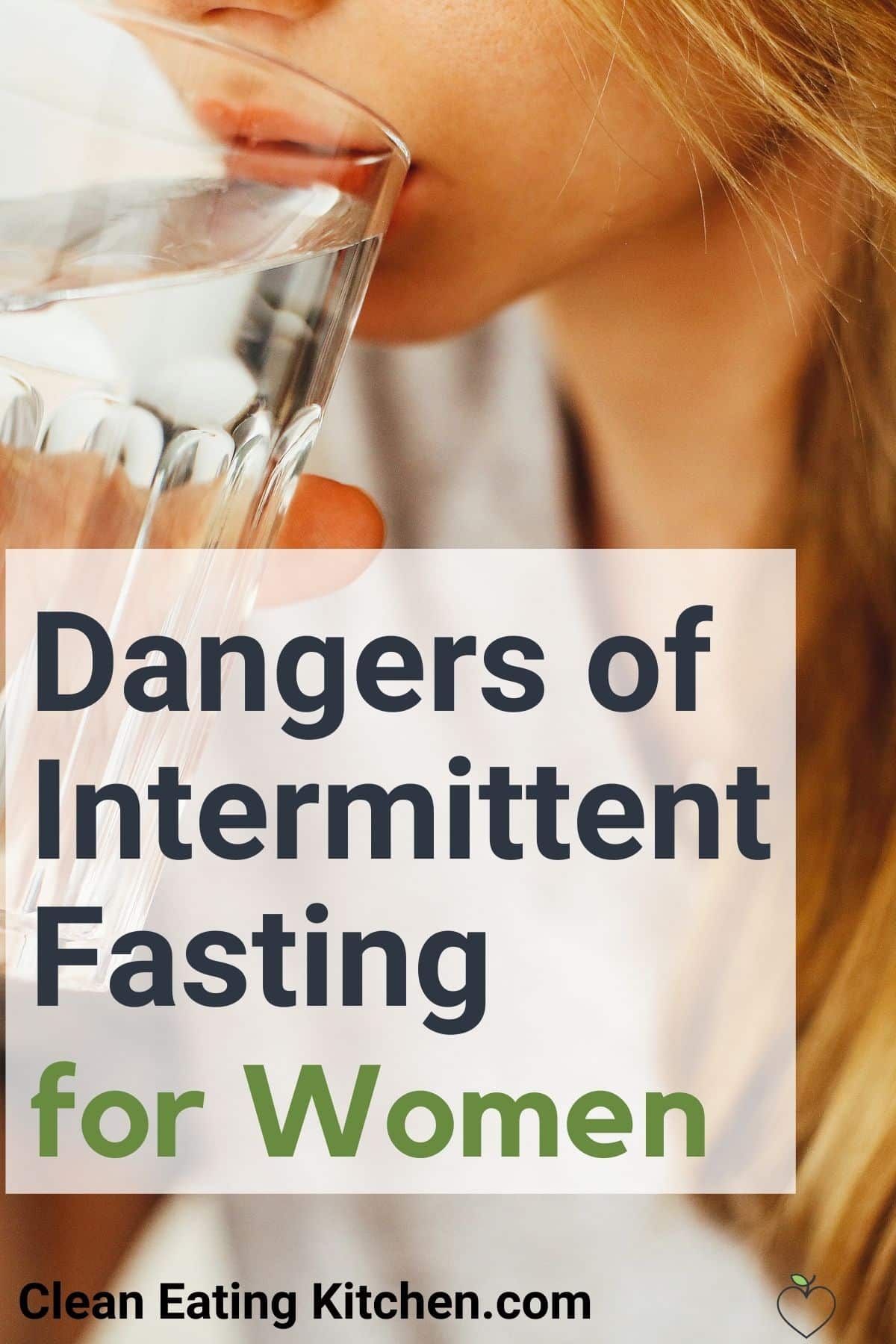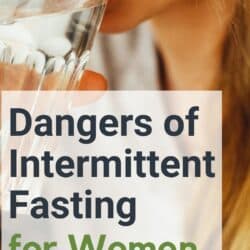7 Potential Dangers of Intermittent Fasting for Women
Intermittent Fasting is a popular diet trend, but is it safe for women? This article includes 7 potential dangers of intermittent fasting for women.

Intermittent fasting, sometimes called “IF,” is a diet trend that involves skipping 1-2 meals a day.
Some other types of fasting include alternate-day fasting or having a fasting window of up to 23 hours a day.
While fasting can make weight loss easier due to the reduction of overall calories, there are some dangers of intermittent fasting that you should know about. This especially true for women of child-bearing age (18-50).
Isn’t Fasting Natural?
While our ancestors undoubtedly went through periods of famine or often had to skip meals due to lack of available food, that doesn’t automatically mean that it’s healthy for today’s modern woman to adopt a fasting diet.
For one, our ancestors didn’t have the stressors that we have, including constant stimulation from digital media, balancing work and family life, being out of touch with our natural environment, and dealing with modern illnesses including thyroid disease, PCOS, and autoimmune issues that so many women face today.
The bottom line is that a healthy diet is likely more nourishing and appropriate for women than periods of fasting. This especially applies to women of child-bearing age whose fertility hormones are sensitive to a lack of calories and nutrition.
Is Intermittent Fasting Safe?
There are more and more studies being published with results from intermittent fasting experiments. The problem is that each study measures something different, and so it’s almost impossible to get a clear answer as to the effectiveness of practicing intermittent fasting, especially over the long term.
Additionally, as with any diet, it comes down to the individual person and what he or she is dealing with. That is why it’s always important to work with your own healthcare practitioner before making any changes to your diet. If you are interested in fasting, be sure to talk with your practitioner so you can make a plan that works best for you situation.
So, while it is impossible to say whether or not fasting is right for you, there are some definite risks that you should be aware of before you venture out onto an intermittent fasting experiment.
Potential Risks of Fasting for Women
1. Reduced thyroid production
If you dramatically decrease your calories intake, your thyroid will respond by releasing less thyroid hormone.
This is a natural way of your body responding to what it thinks might be a famine or state of uncertain food intake. It is your body’s way of forcing you to slow down and burn fewer calories in case there is not enough food to eat.
Human studies done on people who observe the Muslim fasting month of Ramadan have shown that thyroid hormones are affected during this time. The problem is that if you are one of the many women who currently has thyroid disease, you don’t necessarily want to further decrease your thyroid hormone by practicing intermittent fasting.
Lower thyroid hormones than normal can lead to fatigue, low energy levels, mood changes, and feeling tired all the time.
Learn how to order your own lab tests to see if you have optimal thyroid levels.
2. Altered menstrual cycle
Studies have also been done on women who fast during the Muslim holiday of Ramadan related to their menstrual cycles.
Since the menstrual cycle is directly related to women’s fertility and ability to get pregnant, it’s no wonder that reducing calories during fasting will negatively impact menstruation regularity.
For women who are very resilient and don’t normally have problems with their cycle during times of stress, then intermittent fasting may not pose a problem.
For women who do have sensitive cycles, however, you may want to be very cautious about fasting if you don’t want to alter your cycle or miss your period or have a hormonal imbalance. And, of course, it should be said that pregnant women should not fast under almost any condition.
See my related article on the best diet for fertility.
3. Increase in eating disorder behavior
Most people want to fast to try and drop weight quickly, not necessarily due to the potential health benefits such as lowering insulin levels or blood pressure. The focus on cutting calories to lose weight is a short-term goal and not necessarily a long-term diet approach.
Research confirms that there is a risk of developing an eating disorder with fasting. So, it is strongly discouraged for anyone who currently has an eating disorder or who has battled disordered eating in the past to consider intermittent fasting.
Read more about orthorexia and disordered eating behavior.
4. Overall reduced intake of nutrients
There is always a risk with dieting that you won’t get enough nutrients to support your body’s optimal well-being. While it is true that most Americans eat too many calories overall, most Americans are also not eating enough nutrient-dense food.
So, rather than thinking about fasting and skipping meals, it might be a healthier decision for most people to think about adding more vegetables and nutrient-dense foods into their daily routine.
Another risk with fasting is the desire for junk food and other high calorie foods that aren’t necessarily the most nutritious. A better approach to nutrition would be to consider eating three solid meals a day.
Learn more about the healthiest foods and what you should be eating every single day.
Additionally, you might be interested in which vitamins you should be taking to help fill the nutrient gaps.
5. Loss of hunger cues
In an ideal world, we would be eating when we are hungry, and not because it’s meal time or because of emotional reasons. Another risk with intermittent fasting is that you have to ignore your hunger cues if you outside of your eating window.
For the long term, this continued refusal to acknowledge your hunger cues could result in more confusion about when you are truly hungry and when your body is asking for nourishment.
This is even more pronounced with extreme fasting diets such as the OMAD diet (one meal a day).
Getting out of touch with your hunger cues and hunger hormones can be bad for mental health as well.
A better way to manage your weight and honor your body’s hunger hormones would be to consider eating 2-3 balanced meals a day, plus snacks if or when you get hungry between meals.
Balanced meals with complex carbs, lean protein, and healthy fats are the best way to have blood sugar control and to keep body fat and body weight in a good range.
Learn more about metabolism and why eating at throughout the day is important in this article about the pro metabolic diet.
6. Increase in stress hormones/change in mood
Most modern women are over-stressed these days.
While we are achieving more and fulfilling exciting leadership roles, we also have more to do than ever before. Adding an extreme diet like intermittent fasting is just going to drive up your stress hormones even more, as opposed to cutting back on stress.
Research confirms that fasting induces higher levels of cortisol in women. In addition to being more stressed, being hungry due to fasting can also make women crankier and not as happy.
If you think about it, what does your mood usually do when you are hungry? If you are like most women, then you are usually less relaxed and comfortable when you are hungry than when you are nourished.
So, in order to help manage the daily stress of life, consider adding more nourishing foods to your diet throughout the day. This will help regulate blood sugar and likely make you less stressed.
7. Risk of hypoglycemia
Hypoclycemia is low blood sugar, and the risk of it increases the longer you go without food. While our bodies are naturally made for fasting overnight, they aren’t necessarily adapted to go for longer than 8-10 hours without food.
And, if you already have blood sugar issues, then there is an increased risk of low blood sugar on fasting days. In other words, your blood sugar levels may drop too low without food.
FAQs About Fasting For Women
One safe way to practice a more natural rhythm of fasting is to stop eating a few hours before bedtime. So, if you finished dinner at 7 pm and then didn’t eat breakfast until 7 am, then you will have completed a 12 hour fast. When you extend that fast until 16 hours or more, that’s when it comes less natural for most people and the potential risks increase.
Another safer way to practice IF would be to not be so stringent about the timing or the numbers of days you fast. So, you might have an eating window of 10 hours as opposed to 8 hours and you might fast only every third day. Check with your healthcare provider to see what would be the best schedule for you.
Of course not! All women are different. If you are never hungry in the mornings and you’re used to skipping breakfast, then you likely have more resilience to longer fasts. But, if you are the type of woman who gets “hangry” if you miss a meal, then fasting might be harder and riskier for you.
It depends on your goals. Intermittent fasting is not the only way to lose weight, improve insulin sensitivity, or optimize your health. Just because a young, fit male does well with fasting does not mean that it’s appropriate for women. There are other ways to have more energy that aren’t necessarily based around food restriction or food timing.
Fasting is also not the only way to lower your blood sugar, prevent heart disease, lower your body weight, or reduce blood pressure. The bottom line is that you should work with a qualified healthcare professional to determine what is going to work best for you.
Maybe! Even if you aren’t menstruating anymore, you still risk lowering your thyroid hormone production and eating disorder behavior with fasting. But, of course, every woman is different. Speak to your doctor or healthcare provider to help figure out the best diet plan for you.
More Diet Articles You Might Like
Conclusions
While intermittent fasting has become very trendy with the promise of quick weight loss, there are some potential risks and negative effects of intermittent fasting for women that you need to know about.
Additional Resources
1: Aksungar FB, Sarıkaya M, Coskun A, Serteser M, Unsal I. Comparison of
Intermittent Fasting Versus Caloric Restriction in Obese Subjects: A Two Year Follow-Up. J Nutr Health Aging. 2017;21(6):681-685. doi:
10.1007/s12603-016-0786-y. PubMed PMID: 28537332.
Don’t forget to join my newsletter list to get exclusive clean eating recipes and tips. The newsletter is 100% free with no spam; unsubscribe anytime.
About the Author: Carrie Forrest has a master’s degree in public health with a specialty in nutrition and is a certified holistic nutritionist. She is a top wellness and food blogger with over 5 million annual visitors to her site. Carrie has an incredible story of recovery from chronic illness and is passionate about helping other women transform their health. Send her a message through her contact form.
Note: this post is for informational purposes only and is not intended as medical advice. Please consult your healthcare provider for recommendations related to your individual situation.





















Love your articles always. Is there a way to have the links open in a new tab? I don’t like moving away from your site to read a different article. Thanks for all your advice!
All links except affiliate links now open in the same tab. 🙂
ALL OF THESE HAPPENED TO ME. DO NOT FAST UNLESS ABSOLUTELY NECESSARY.